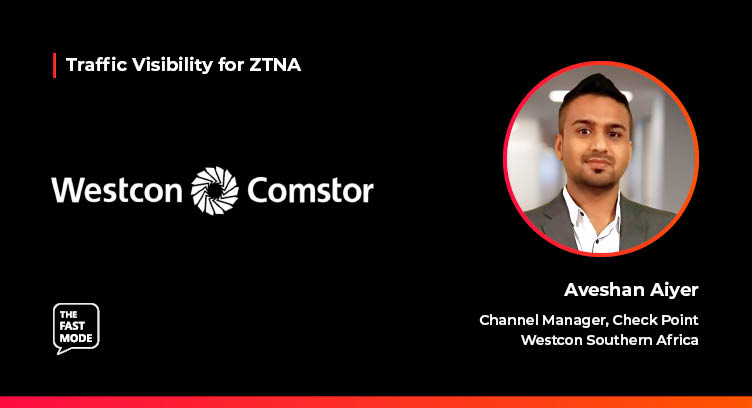By Aveshan Aiyer, Channel Manager for Check Point at Westcon-Comstor Southern Africa
Cybercrime is costing South Africa R69 billion a year. The numbers are shocking, but they don’t tell the full story. The real impact goes beyond the headlines: It’s in the businesses left reeling, the critical infrastructure that could be disrupted and the ripple effect on our economy. Yet, despite this, many organisations still don’t act until it’s too late.
According to findings from Check Point, South Africa faces over 3,300 cyberattacks on government systems every week. Ransomware incidents have surged by 90%, and the economic toll of cybercrime is now estimated at R69 billion annually, which is roughly 1% of the nation’s GDP.
Partners deliver more than tech
Yes, sure, when you think of cybercrime and the cybersecurity needed to thwart it, you will immediately think of technology, products, and appliances. But there’s another key player in this equation: the channel. The unsung heroes who are tirelessly working towards partnering with the right technologies, understanding the local landscape, honing their skills, and getting their hands dirty when helping clients prevent, and on occasion, fix security problems.
Why the channel? Not because these partners have all the answers, but because they are closest to the environments where real decisions are made and delayed, the proverbial coalface where all the action unfolds and decisions taken can either help prevent a threat or throw the door open to criminals.
The Channel’s Expertise: From Theory to Practice
What is the reality? Cyber threats are real and on the rise, but in Southern Africa resilience means more than just investing in the latest tech. It’s about making smart, strategic decisions in environments with limited resources and infrastructure challenges.
This is where the channel shows its true value. The cybersecurity landscape is crowded and complex, with every vendor claiming to be the answer. What a channel partner can assist with is ensuring that decision-making doesn’t become overwhelming. This is especially true in the public sector, where teams are often under-resourced and stretched thin. Partnering with an organisation that has already done the homework for you is a game-changer. It helps you get to the answers you need that much quicker!
In fact, distributors and partners aren’t just middlemen in purchasing decisions. Well, at least they shouldn’t be. The right partner is one that has the experience to turn high-level security solutions into functioning parts of the business – delivering on what they are supposed to – fixing your security posture.
Partners bring a valuable asset to the table – namely, local know-how, applied in real time, that makes the difference between a product that sounds good on paper and one that truly protects an organisation. They don’t just translate technology, they translate value, and they strip away the complexity of selecting the right solutions. If the channel were to have a super power, it would be taking advanced technologies and turning them into practical, scalable strategies.
Now let’s consider the role of the distributor. In a world where there are no more boxes to shuffle through customs processes and software is delivered via the cloud, what is the distributor’s role? ICT distribution is more than just moving products; it’s about stepping into a more strategic role and helping partners design with intent. That means supporting partners with the tools, knowledge, and insights they need to build contextualised, future-fit security strategies.
Whether it’s through proof-of-concept environments, hands-on demos, or collaborative design sessions, the value of the channel lies in its ability to make security real and relevant.
Empowering the Channel to Tackle Cybercrime
The technology, which is ultimately the product, plays a critical role in ensuring effective cybersecurity, but it’s the channel’s local expertise, focus on continuous learning, and strategic intent that translate cybersecurity theory into meaningful action. That is just a fancy way of saying the channel can really help you get the most out of the product you buy. Which takes more than product knowledge, it demands ongoing skills development, deeper customer insight, and a mindset rooted in co-creation, not just configuration.
So, the knowledge that cybercrime costs South Africa an estimated R69 billion a year means there is a gap, it means we are doing a poor job of fighting cybercrime, it may even mean we aren’t investing in the right tech to do the job, which implies that businesses must move away from a business-as-usual way of thinking.
Perhaps it is time to call in the experts and develop partnerships with organisations that are geared to help lead a security rethink, because they have the tools and the know-how to respond to threats and help design the secure operating models of tomorrow.
Take action with the channel
Execution is the real differentiator. It is what will help businesses in Southern Africa get ahead of the security challenge. And if it’s execution you want, then it’s the channel you need, as the channel’s strength lies in its ability to turn frameworks into tangible, context-specific action. The kind that doesn’t just protect, it helps organisations adapt and grow in a threat landscape that is just about impossible to stay on top of.
If customers have a channel focusing on enablement, execution, and long-term outcomes, that channel becomes more than just a route to market. It becomes a catalyst for national cyber resilience.
And that’s not just theory. That’s practice.


